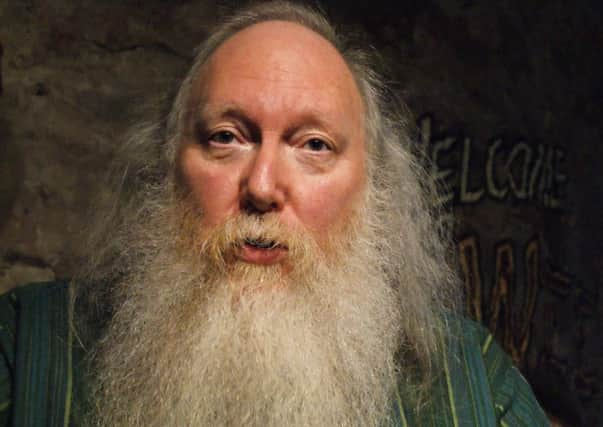Obituary: Eberhard '˜Paddy' Bort, academic, folk music activist and local democracy champion


Eberhard Bort arrived in Scotland in 1995 and embraced the culture and current affairs of his adopted country with characteristic gusto, both as an activist and commentator within the burgeoning traditional music scene, and in his academic work and advocacy of local democracy. He was an ebullient, larger than life character with an underlying seriousness of purpose.
The widespread shock at his sudden passing reflects the regard in which he was held in both folk and academic circles. Those familiar with the hirsute, affable host of Edinburgh Folk club, or its diminutive cousin down the road, the Wee Folk Club at the Royal Oak, might not necessarily have appreciated the importance of his work as a lecturer in politics at the University of Edinburgh, academic co-ordinator of the Parliamentary Interns programme at the university’s Academy of Government, and his campaigning for improved local democracy through his writing and through initiatives such as the Scottish Rural Parliament and Nordic Horizons.
Advertisement
Hide AdAdvertisement
Hide AdBort grew up in Ilsfeld in Germany’s south-western state of Baden-Württemberg, attending primary school in Ilsfeld and the Justinus-Kerner- Gymnasium in Heilbronn. Following community service work in a hospital, he attended Tübingen University, graduating in English and German in 1985, with a thesis on “Anglo-Irish relations in 20th-century Irish Drama” and working in the university’s department of British and Irish studies with the historian (and later MSP) Professor Christopher Harvie, who has summed up Bort’s life as “devoted to peace, regionalism, socialism, learning and drama”.
It was at Tübingen’s Brechtbau theatre that he became interested in the stage, later helping convert a redundant cloakroom into a theatre and playing Hugh the hedge-schoolteacher in the university’s Anglo-Irish theatre group production of Brian Friel’s Translations.
In the late 1970s he spent a significantly formative year teaching German studies at Trinity College Dublin where, among other things, he became involved in staging German and Irish theatre and was beguiled by the burgeoning Irish music scene. He then moved on to teach at the University of Puget Sound in Washington State, USA.
“Paddy”, as he was invariably known, arrived at the University of Edinburgh in 1995, initially working with Professor Malcolm Anderson on an ESRC-funded research project on “The Internal and External Frontiers of the European Union”. He became associate director of the university’s International Social Sciences Institute and academic co-ordinator of its Institute of Governance, convening the Institute’s Political Internship programme.
He taught a range of subjects including Scottish society and culture, contemporary Irish politics, British studies and “The Politics of Borders”. “In a former life,” as he put it, he had gained early political insight serving as a Social Democratic Party councillor in Ilsfeld for 15 years.
During the 1990s, he became increasingly interested in the Nordic countries, visiting Scandinavia and co-ordinating a series of visits by Danish teachers to Scotland. Writing on the Scottish Rural Parliament website last September, he pointed out that Scotland has both the largest council units and the weakest community tiers of government in Europe, declaring: “The moment more powers are devolved to Holyrood should be the perfect time to devolve powers from Holyrood to local communities. Reclaiming local democracy is not a distraction in the current debate, it is an essential cornerstone of a renewed democracy in Scotland.”
With Robin McAlpine, director of the Common Weal think tank, he co-edited the report Silent Crisis, on the state of local democracy in Scotland. McAlpine this week described Scotland as “lesser for Paddy’s passing … He played an essential role in shaping the concept of the European social democratic and Nordic models of an independent Scotland.”
Paddy invariably had a book or paper on the boil, such as Networking Europe: Essays on Regionalism and Local Democracy, and, most recently The Annals of the Parish: A Decade of Devolution, which chronicled the ten years from 2003 to the eve of the independence referendum.
Advertisement
Hide AdAdvertisement
Hide AdHe died just as the book he co-wrote with journalist and broadcaster Lesley Riddoch, McSmörgåsbord, examining what post-Brexit Scotland can learn from the Nordic nations, was due to be published by Luath Press. Riddoch described her collaborator as “an all-round European at a time when that has never been more vitally needed”.
In parallel with his academic and political activities, Bort threw himself into the Scottish folk scene. He was a founder member of the renowned Wee Folk Club at the Royal Oak and, at the time of his death, had been chairman for 16 years of the long-established Edinburgh Folk Club.
In 2002 he established with EFC the annual Carrying Stream Festival in memory of his hero, the poet and folklorist Hamish Henderson, whose life and legacy he further celebrated by editing four volumes of contributed essays and other writings about Henderson.
Back on his home turf, he helped organise music events, including the Inselfolk Festival at the Phoenix Irish pub in Lauffen-am-Neckar, bringing many Scottish artists there, including the award-winning band Malinky, whose Steve Byrne observed, in an eloquent tribute, that Bort’s passing left “a hole the size of Arthur’s Seat” in the Edinburgh folk scene.
Just the day before his death, Bort had met with Hamish’s widow, Katzel, to discuss material for a further book. Katzel was devastated at the subsequent news of her fellow-German’s death, describing him as “totally irreplaceable”.
He was predeceased by his parents and a younger brother, Klaus, and is survived by his brother Juergen and sister Ursula.
jim GILCHRIST